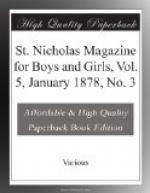Find a word, letters, or a letter, descriptive of each picture, and containing as many letters as there are numerals beneath the picture itself. This is the first process. Then write down, some distance apart, the figures 1, 2, 3, 4, 5, 6, to correspond with the words of the answer. Group beneath figure 1 all the letters designated by the numeral 1 in the numbering beneath the pictures. You will thus have in a group all the letters that spell the first word of the line, and these letters, when set in the right order, will spell the word itself. Follow the same process of grouping and arranging, in making the remaining five words of the answer. Of course, the re-arrangement of the letters need not be begun until all of them have been set apart in their proper groups.
S.R.
THREE DIAMONDS.
I.—1. A consonant. 2. A kind of carriage. 3. A well-known river of Italy. 4. A precious stone. 5. In circumnavigator.
II.—1. In inconspicuous. 2. A Turkish name. 3. A spice. 4. A climbing plant. 5. In herbalist.
III.—1. In iniquity. 2. A girl’s name. 3. A country in Asia. 4. Purpose. 5. In Niagara.
ALLIE.
RIDDLE.
A head have I, though never do I think;
A mouth as well, but with it never drink.
A body, too, is mine, of giant growth
and strength,
Combining with its force majestic length.
But, as to feet, of them I have not one,
Though I am never still, but always run.
Ne’er was I known to leave my lowly
bed,
Or ope my mouth so that I might be fed.
E.S.S.
POSITIVES AND COMPARATIVES.
The positive is found from the first definition given, and the comparative is made by adding the sound “er” to the positive.
1. My positive is level, and my comparative is what one’s true friends never do. 2. My positive is an article of food, and my comparative is a tool. 3. My positive is coarse, and my comparative is a trade. 4. My positive is a youth, and my comparative is an instrument for climbing. 5. My positive is a preposition, and my comparative is to esteem. 6. My positive is a part of the body, and my comparative is wrath. 7. My positive is an American poet, and my comparative is part of the body. 8. My positive is an article of food, and my comparative is something used in a part of Asia. 9. My positive is a public place, and my comparative is a sufferer.
G.S.
HIDDEN NAMES.
Find a girl’s or a boy’s name hidden in each of the following sentences.
1. Arthur likes my apples. 2. Herbert expected letters every night. 3. Alice rode to her uncle Robert’s. 4. Mr. Allen bought eight lambs. 5. Hattie Arnold reached Rochester yesterday. 6. Even Theodore has eaten little. 7. Every rainy night Eva sews trimming. 8. Ellen’s dog is terribly hurt. 9. Florence rides every day. 10. Softly the evening light lingers around. 11. Even dull wits improve, nowadays. 12. Generally, raisins are capital eating. 13. Fido ran after Ned’s kite.




